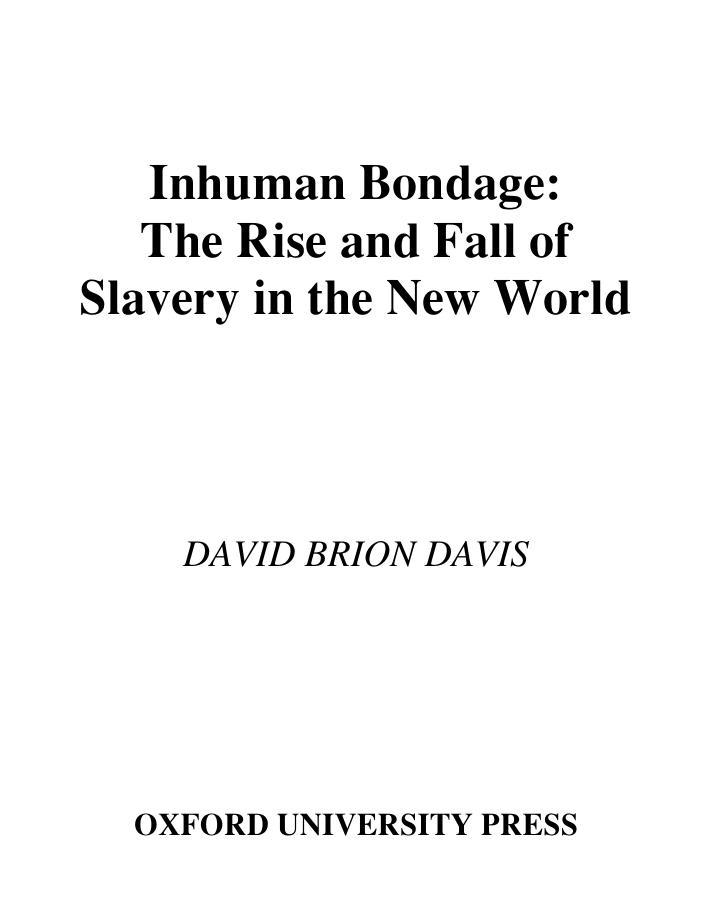Inhuman Bondage: The Rise and Fall of Slavery in the New World by David Brion Davis

Author:David Brion Davis [Davis, David Brion]
Language: eng
Format: epub, mobi, pdf
Publisher: Oxford University Press
Published: 2006-04-01T07:00:00+00:00
IT WAS ONLY IN 1993 that students of slave resistance and general readers interested in the Civil War learned of a hidden slave conspiracy that might have had a considerable impact on the war’s western theater if timed, as the slaves had hoped, with the Union’s capture of the lower Mississippi Valley. I refer to the publication of Winthrop D. Jordan’s widely praised book, Tumult and Silence at Second Creek: An Inquiry Into a Civil War Conspiracy.67 Since the planters and other authorities involved made no pretense of conducting a trial, there are far fewer sources than for Vesey’s plot. Indeed, the main document is a record kept by a Mississippi planter, Lemuel P. Conner, of slave testimony given to a secret Examination Committee at an isolated racetrack in Adams County, Mississippi, in September and October 1861, five to six months after the war began. The interrogation of the slaves, conducted apparently with severe torture, led to the execution of more than forty blacks, including several privileged drivers of family carriages.
Jordan’s account of what I take to be a major slave conspiracy at the beginning of the Civil War is a venture in historical therapy, an attempt to overcome generations of denial and repression concerning the nature of racial interaction in America and the ultimate meaning of the Civil War. Jordan’s twenty-odd years of detective work represent an effort to master silence—the curtain of silence that fell over the whites’ discovery of and response to the Mississippi plot. As we hear the aspirations, the pain, the rage of African Americans—as opposed to “the-happy-go-lucky, lovable ol’ darkies of magnolia-blossom historic legend”—we come to realize that tyranny is a central theme of American history, that racial exploitation and racial conflict have been part of the DNA of American culture.68
As Jordan makes clear, however, the “lovable ol’ darkies” were something more than legend. He quotes from a remarkable letter sent by the daughter of a Mississippi planter-politician to her husband, a Confederate officer then at the front in Virginia:
Download
Inhuman Bondage: The Rise and Fall of Slavery in the New World by David Brion Davis.mobi
Inhuman Bondage: The Rise and Fall of Slavery in the New World by David Brion Davis.pdf
This site does not store any files on its server. We only index and link to content provided by other sites. Please contact the content providers to delete copyright contents if any and email us, we'll remove relevant links or contents immediately.
| African-American Studies | Asian American Studies |
| Disabled | Ethnic Studies |
| Hispanic American Studies | LGBT |
| Minority Studies | Native American Studies |
Cecilia; Or, Memoirs of an Heiress — Volume 1 by Fanny Burney(32548)
Cecilia; Or, Memoirs of an Heiress — Volume 2 by Fanny Burney(31947)
Cecilia; Or, Memoirs of an Heiress — Volume 3 by Fanny Burney(31931)
The Great Music City by Andrea Baker(31917)
We're Going to Need More Wine by Gabrielle Union(19034)
All the Missing Girls by Megan Miranda(15958)
Pimp by Iceberg Slim(14488)
Bombshells: Glamour Girls of a Lifetime by Sullivan Steve(14057)
For the Love of Europe by Rick Steves(13913)
Norse Mythology by Gaiman Neil(13349)
Talking to Strangers by Malcolm Gladwell(13349)
Fifty Shades Freed by E L James(13233)
Mindhunter: Inside the FBI's Elite Serial Crime Unit by John E. Douglas & Mark Olshaker(9324)
Crazy Rich Asians by Kevin Kwan(9279)
The Lost Art of Listening by Michael P. Nichols(7494)
Enlightenment Now: The Case for Reason, Science, Humanism, and Progress by Steven Pinker(7306)
The Four Agreements by Don Miguel Ruiz(6745)
Bad Blood by John Carreyrou(6611)
Weapons of Math Destruction by Cathy O'Neil(6265)
